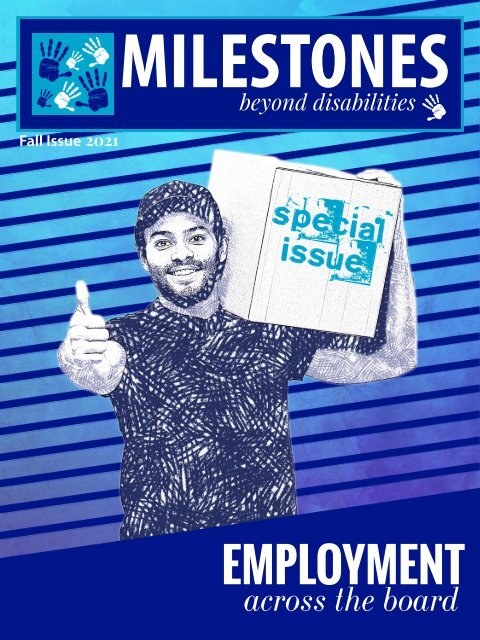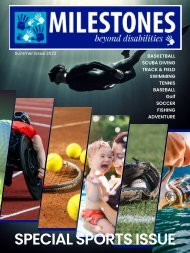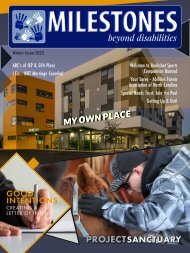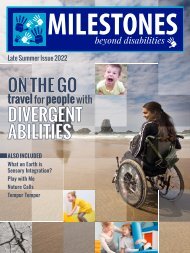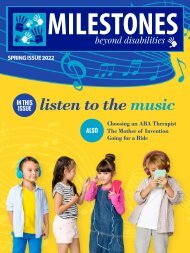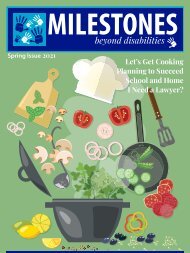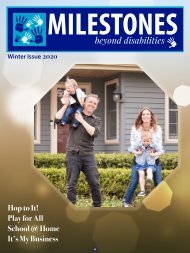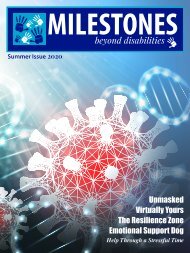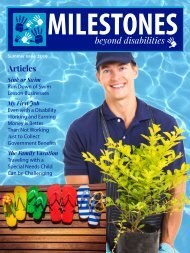Special Issue! Employment Across the Board
Special Issue! Employment Across the Board - dedicated to employment for individuals with disabilities. We're committed to helping Individuals with Disabilities & their Families Achieve & Celebrate Events & Milestones in their Lives!
Special Issue! Employment Across the Board - dedicated to employment for individuals with disabilities. We're committed to helping Individuals with Disabilities & their Families Achieve & Celebrate Events & Milestones in their Lives!
Create successful ePaper yourself
Turn your PDF publications into a flip-book with our unique Google optimized e-Paper software.
eyond disabilities<br />
Fall <strong>Issue</strong> 2021<br />
special<br />
issue<br />
EMPLOYMENT<br />
across <strong>the</strong> board
contents<br />
EMPLOYMENT<br />
<strong>Across</strong> <strong>the</strong> <strong>Board</strong><br />
03 Support <strong>Employment</strong> Family Style<br />
05 Transitioning Disabilities into<br />
<strong>the</strong> Workforce<br />
07 Ticket to Work, IRWE and<br />
PASS it on!<br />
09 Entering <strong>the</strong> Workforce What to Say<br />
(or not) about a Disability<br />
11 Supported <strong>Employment</strong><br />
Organization Style<br />
13 Customized <strong>Employment</strong><br />
15 Minding Your Own Business<br />
17 Competitive <strong>Employment</strong><br />
19 Job Roundup Chicago<br />
21 At Your Service<br />
Publisher<br />
Susie Redfern, is <strong>the</strong> parent of a special<br />
needs child who recently “aged out”<br />
of <strong>the</strong> public-school system.<br />
She developed Milestones Magazine<br />
to help individuals with disabilities<br />
and <strong>the</strong>ir families achieve and celebrate<br />
events and milestones in <strong>the</strong>ir lives.<br />
info@milestonesmagazine.com<br />
1<br />
MilestonesMagazine.net
SUPPORT EMPLOYMENT<br />
FAMILY STYLE<br />
Many folks, including people with disabilities, get <strong>the</strong>ir first job in <strong>the</strong> family<br />
business. Some of <strong>the</strong>se individuals stay with, and eventually take over, <strong>the</strong><br />
business. For individuals with disabilities, <strong>the</strong> term “supported employment”<br />
is often used in association with <strong>the</strong>se family work settings.<br />
A publication, “Building Bridges to <strong>the</strong> future” (created through a grant from<br />
<strong>the</strong> Coleman Foundation, and distributed to Illinois families of teens, ages<br />
14-21 enrolled in transition programs at <strong>the</strong>ir school), describes supported<br />
employment this way.<br />
“In this program, organizations seek employment opportunities in <strong>the</strong> local<br />
community for <strong>the</strong> individuals <strong>the</strong>y serve. A job match is conducted to pair <strong>the</strong><br />
right job for <strong>the</strong> right individual. Full and part tie employment opportunities<br />
are developed and <strong>the</strong> individual is provided training and support by a job coach<br />
hired by <strong>the</strong> organization.”<br />
In Illinois, supported employment is available for individuals with significant<br />
disabilities who have an open case at <strong>the</strong> Division of Rehab. Services (DRS) and<br />
referred to a (typically) non-profit organization (every state has its own procedures<br />
on how this is done).<br />
However, not all individuals with disabilities can, or wish to, receive this<br />
assistance. For those folks, “natural supports” are <strong>the</strong> norm, usually supplied<br />
by <strong>the</strong> employer (often a family member) and co-workers (as applicable). This<br />
is especially true when a business has been created by/for <strong>the</strong> individual<br />
(sometimes called a micro-enterprise) based on his/her interests and talents.<br />
3
On that note, I am pleased to introduce Terri<br />
Jordan, co-author of <strong>the</strong> article “Let’s Get<br />
Cooking”, which appeared in <strong>the</strong> last issue of<br />
Milestones Magazine. Terri’s son assembles The<br />
Color-Coded Chef kits for shipment. I invite her<br />
to write about <strong>the</strong> supports she provides her son<br />
while on <strong>the</strong> job.<br />
I brought my friend’s daughter into work to<br />
move along <strong>the</strong> path from following directions<br />
to giving directions. My son had to tell and<br />
show her <strong>the</strong> steps needed to clean <strong>the</strong> room,<br />
assemble <strong>the</strong> kits and restock merchandise<br />
without help from an adult. We are now<br />
adjusting <strong>the</strong> job from following instructions to<br />
learning communication skills rounding out <strong>the</strong><br />
“A couple of years ago, when my son and I<br />
started this process, <strong>the</strong> first task was determining<br />
<strong>the</strong> best method of communication to do <strong>the</strong><br />
individual. While <strong>the</strong> tasks may be repetitious,<br />
we are developing <strong>the</strong> thought processes in <strong>the</strong><br />
individual by expressing <strong>the</strong> work in a new way.<br />
job. Verbal prompts work to a point, but <strong>the</strong>y<br />
also teach <strong>the</strong> employee to wait for a prompt<br />
before moving to <strong>the</strong> next task. To help my<br />
son be a bit more independent, I chose visual<br />
communication. I created a task sheet with<br />
simple pictures to provide <strong>the</strong> steps needed to<br />
complete <strong>the</strong> assembly of <strong>the</strong> kit. However, in a<br />
The next stage in developing job skills will<br />
empower <strong>the</strong> individual to recognize obstacles<br />
and encourage <strong>the</strong>m to improve <strong>the</strong> job position.<br />
One step at a time, taking <strong>the</strong> challenges<br />
of work and making <strong>the</strong>m opportunities in work<br />
will be <strong>the</strong> cornerstone of success.”<br />
job setting, a person does not just come in and<br />
do this one task and leave. Additional sheets<br />
are used to provide <strong>the</strong> steps needed to<br />
complete before and after <strong>the</strong> kit assembly,<br />
Terri Jordan can be reached by phone at<br />
636-422-1515, on Facebook, www.facebook.<br />
com/<strong>the</strong>colorcodedchef, or through her<br />
like wiping down <strong>the</strong> tables and disposal of <strong>the</strong><br />
wipes into <strong>the</strong> proper receptacle, restocking<br />
<strong>the</strong> merchandise on <strong>the</strong> shelves for <strong>the</strong> next day<br />
of <strong>the</strong> assembly.<br />
website, www.TheColorCodedChef.com<br />
M<br />
“<br />
I created a task sheet<br />
with simple pictures<br />
to provide <strong>the</strong> steps needed<br />
to complete <strong>the</strong> assembly<br />
of <strong>the</strong> kit.<br />
4
TRANSITIONINGTeens with<br />
Disabilities into <strong>the</strong> Workforce<br />
My one heartache as a special education teacher is when I find<br />
Lead-In to <strong>Employment</strong>:<br />
High School Transition<br />
out that my students that have graduated are home; not working<br />
or in a program. My goal for <strong>the</strong>m is dignity and quality of life.<br />
For most students in a public-school setting, even with severe<br />
disabilities, <strong>the</strong>re is something for <strong>the</strong>m after graduation. In<br />
Preparing for adult life is a process that, in some ways,<br />
can start as young as infancy. But <strong>the</strong> largest portion of<br />
this process usually occurs during a child’s teens and<br />
young adult years, when <strong>the</strong>y often get <strong>the</strong>ir first job,<br />
stretch <strong>the</strong>ir legs, so to speak, with extracurricular<br />
activities, and prepare for college or o<strong>the</strong>r post-secondary<br />
experiences. For students with disabilities, <strong>the</strong>ir high<br />
<strong>the</strong> case of my students, it does take more planning than <strong>the</strong>ir<br />
neurotypical peers.<br />
I teach a self-contained special education class of students with<br />
severe disabilities. They all have an Intellectual Disability and<br />
most are comorbid with Autism, ADHD, Speech and Language<br />
Impairments, and Orthopedic Impairments. Their IQs are all<br />
60 and below.<br />
school experience may include extra supports, which<br />
can extend beyond <strong>the</strong> traditional graduation at age 18.<br />
I am pleased to introduce Linda Gilmartin, a special<br />
education teacher from New York, to give a glimpse<br />
into her high school transition classroom.<br />
Our classroom is a fun, family type setting where academics and<br />
social skills are learned. These students are treated as I would<br />
treat my own children. They have responsibilities and are<br />
expected to act appropriately. My vision for <strong>the</strong>m when I get<br />
<strong>the</strong>m in 9th grade, is how can I prepare this student for <strong>the</strong>ir<br />
particular future? It is different for each student.<br />
5
I ensure that <strong>the</strong>y reach <strong>the</strong>ir individual potential academically<br />
to give <strong>the</strong>m quality of life. They are expected to do most things<br />
<strong>the</strong>mselves and learned helplessness is not an option. The only<br />
way to fully achieve this is when <strong>the</strong> parents are totally on board.<br />
When that happens, magic happens. Then <strong>the</strong> student knows<br />
this is real life, not just school life, and it becomes second nature<br />
for <strong>the</strong>m.<br />
I have a book on Amazon entitled, “Transitioning <strong>Special</strong> Needs<br />
Teenagers”, which goes more into detail about everything I have<br />
outlined above, including some real-life stories. In addition, I<br />
have a Facebook group, entitled, “Transitioning Teens/Adults<br />
with Disabilities Life After High School”. It currently has almost<br />
3k members and I research valuable resources and post <strong>the</strong>m,<br />
o<strong>the</strong>r people do <strong>the</strong> same and it gives parents a chance to see<br />
what is out <strong>the</strong>re. I started that group when I realized it is not<br />
We also have a school to work study program. When <strong>the</strong><br />
students turn 16, <strong>the</strong>y can participate in this program. They go<br />
out 2 days per week for 2 hours at different job sites throughout<br />
<strong>the</strong> year. When <strong>the</strong>y are seniors, <strong>the</strong>y go out for 4 days. This is<br />
every special education teacher’s job to do <strong>the</strong> transitioning<br />
preparation that I do. It is my vision that <strong>the</strong> Facebook group is<br />
doing that. I archive those resources on my website,<br />
www.transitioningspecialneedsteenagers.com.<br />
to help <strong>the</strong> individuals experience <strong>the</strong> work force and <strong>the</strong>ir<br />
options for post-graduation. For some students <strong>the</strong>y can be<br />
enrolled in <strong>the</strong> <strong>Employment</strong> Training Program and be paid by<br />
It truly is an honor and a privilege to be a part of this process for<br />
<strong>the</strong>se wonderful teens.<br />
<strong>the</strong> state for 2 years in <strong>the</strong> hopes that <strong>the</strong> student will prove<br />
<strong>the</strong>mselves worthy to be hired outright by <strong>the</strong> employer.<br />
Linda Gilmartin<br />
The o<strong>the</strong>r part of this is <strong>the</strong> application process for state<br />
services. This begins in 9th grade we fill out <strong>the</strong> application<br />
for OPWDD which is <strong>the</strong> state service for New York. I ga<strong>the</strong>r<br />
TRANSITIONINGTeens with<br />
<strong>Special</strong> Needs Teenagers<br />
<strong>the</strong> necessary documents to attach and it gets sent to <strong>the</strong> state<br />
for review. Then it is something that needs to be checked up on<br />
constantly to be sure <strong>the</strong>y are not lost in <strong>the</strong> system. It can take<br />
a good 2 years before a student is qualified. Then <strong>the</strong>y receive a<br />
Care Manager. This Care Manager will have <strong>the</strong>ir finger on all<br />
<strong>the</strong> state services that <strong>the</strong> student can utilize to be productive<br />
after high school.<br />
Editor’s Note: In Illinois, transition programs for qualifying<br />
students end at age 22 (or, with recent legislation, <strong>the</strong> end of <strong>the</strong><br />
school year in which a child turns 22). Vocational services are<br />
available for those deemed eligible with <strong>the</strong> Division of<br />
Rehab. Services (DRS), who contracts <strong>the</strong>ir case out to, typically,<br />
a non-profit agency that serves adults with disabilities. Ano<strong>the</strong>r<br />
side of this coin is Home-Based Services, a Medicaid-waiver<br />
program, which helps families find and pay for community<br />
My job is all about collaboration with parents, Care Managers,<br />
and Job Coaches. When we are all on <strong>the</strong> same page. I know that<br />
students will be busy 5 days a week after high school. Even if it<br />
is one or two-days part time, with <strong>the</strong> o<strong>the</strong>rs in a program or<br />
activities, vocational training/employment, housing options,<br />
and so on, according to each family’s circumstances and needs.<br />
These supports sometimes come right when a teen has “aged<br />
out” of <strong>the</strong> school system, making for a seamless transition,<br />
volunteer work, <strong>the</strong>y are productive members of a community.<br />
but more often than not, <strong>the</strong>re is a years-long gap.<br />
M<br />
6
Ticket to Work,<br />
IRWE<br />
and<br />
PASS<br />
it on!<br />
Finding/keeping a job, especially <strong>the</strong> first<br />
job, can be a struggle for anyone. That old<br />
“Catch-22”, “you can’t get experience without<br />
a job; you can’t get a job without experience”<br />
can be an obstacle for anyone. This can be<br />
especially true for people with disabilities.<br />
In addition to <strong>the</strong> usual obstacles to<br />
employment, some folks with disabilities<br />
are concerned about losing government<br />
benefits, in particular with Medicaidwaiver<br />
programs and/or Supplemental<br />
Security Income (SSI) if <strong>the</strong>ir assets (income<br />
not spent in any given month) goes over <strong>the</strong><br />
typical $2000 limit.<br />
7
There are a number of strategies to deal with this<br />
obstacle. I am outlining a couple here, courtesy of<br />
Autism Speaks.<br />
“Ticket to Work (TTW)<br />
The TTW Program is an innovative program that<br />
can connect you with free employment services to<br />
help you decide if working is right for you, prepare<br />
for work, find a job or maintain success while you<br />
are working. It is a free and voluntary service. If you<br />
choose to participate, you will receive services such<br />
as career counseling, vocational rehabilitation, and<br />
job placement and training from authorized Ticket<br />
to Work service providers.<br />
Impairment-Related Work Expenses (IRWE)<br />
Social Security can deduct <strong>the</strong> cost of certain items,<br />
such as transportation services, medical devices, etc.,<br />
that are directly related to your disability and you must<br />
have to work. This means that when Social Security<br />
measures your income compared to <strong>the</strong> benefit limit,<br />
<strong>the</strong>y will subtract <strong>the</strong> cost of <strong>the</strong>se expenses.<br />
Plan to Achieve Self-Support (PASS)<br />
A PASS allows you to set-aside expenses related<br />
to achieving a work goal. These expenses may<br />
include start-up funding for a business, a<br />
vocational assessment, training, etc. Social Security<br />
does not count <strong>the</strong> income you set aside when <strong>the</strong>y<br />
calculate your SSI payment amount or eligibility<br />
for SSI. For example, a PASS Must be specific to<br />
achieve a detailed work.”<br />
Thanks to Autism Speaks for this information. You can<br />
access <strong>the</strong> complete article, and fur<strong>the</strong>r information<br />
at this link: www.autismspeaks.org/family-services/<br />
adult-services/autism-and-employment/benefits. M<br />
8
ENTERING THE WORKFORCE<br />
What to say (or not) about a Disability<br />
For teens or adults who have a condition or disability<br />
that is not obvious to a potential employer, <strong>the</strong> issue of<br />
whe<strong>the</strong>r to disclose it can be paramount. An employer is<br />
not legally permitted to ask, but also is not obligated to<br />
offer any accommodations for a condition he/she<br />
doesn’t know about.<br />
To address this complicated question, I am pleased to<br />
introduce Jim Hasse, ABC, GCDF, owner of Hasse<br />
Communication Counseling, LLC, who, as a person<br />
with cerebral palsy, served for 10 years as a vice<br />
president in a Fortune 500 company during his<br />
29-year career in corporate communication. He’s an<br />
Accredited Business Communicator, certified as a<br />
Global Career Development Facilitator and author<br />
of 14 Amazon books about disability awareness<br />
and disability employment issues.<br />
This is an abbreviated version of his article, which<br />
appeared in an earlier issue of Milestones Magazine.<br />
9
“When to disclose disability (on a job application, on a resume,<br />
before a job interview etc.) is a key issue you need to discuss with<br />
<strong>the</strong> job applicant.<br />
Strategy 2: Disclosing your disability as soon as possible<br />
Include a “Personal Statement,” a few paragraphs in length on a<br />
separate sheet or document, with your resume. In this statement,<br />
briefly describe your condition and explain what adaptive<br />
As a career development facilitator, I tell my clients this:<br />
strategies you use to get your work done.<br />
“When to tell prospective employers about your disability<br />
depends on your disability, your job opportunity, your<br />
personality and your prospective employer.”<br />
Strategy 3: Positioning your disability as a competitive edge<br />
Instead of selecting an option for when to reveal your condition<br />
to a prospective employer (as though your disability always has<br />
In o<strong>the</strong>r words, this disability disclosure issue goes far beyond<br />
<strong>the</strong> job application. And <strong>the</strong>re are no easy answers. Yet, every job<br />
seeker with a disability eventually needs to personally come up<br />
to be a negative factor), turn <strong>the</strong> table 180 degrees. Position<br />
your disability experience as your competitive edge and target<br />
employers who claim to be disability friendly.<br />
with a strategy for addressing this matter.<br />
Those are <strong>the</strong> options I believe your high school student with<br />
Remember, under <strong>the</strong> Americans with Disabilities Act (ADA),<br />
your child is not required to disclose his or her condition to an<br />
employer, even though it may just be a mom or pop candy store<br />
down <strong>the</strong> street. And, if and when your child does disclose, he or<br />
condition faces as he or she struggles with this sometimes-tough<br />
disability disclosure issue that crops up as soon as his or her first<br />
job application needs to be completed. Which to choose boils<br />
down to personal preference and personal situation.<br />
she is not required to tell everything about <strong>the</strong> personal aspects<br />
of his/her condition. In o<strong>the</strong>r words, once your child discloses<br />
But, here’s ano<strong>the</strong>r wrinkle to this issue.<br />
<strong>the</strong> condition. a potential employer can only ask for limited<br />
information about that disability.<br />
On March 24, 2014, new rules for Section 503 of <strong>the</strong><br />
Rehabilitation Act took effect, covering employers who are<br />
Upon request, information about disability can be confidential.<br />
federal contractors or subcontractors.<br />
Your child’s co-workers do not need to know about his or her<br />
condition or <strong>the</strong> need for accommodations.<br />
The new rules require federal contractors and subcontractors<br />
to aspire to, and track progress toward, employing individuals<br />
With those guidelines in mind, consider <strong>the</strong>se three potential<br />
with disabilities.<br />
disclosure strategies, which are largely mutually exclusive. Each<br />
option largely stands on its own, has important advantages as<br />
well as disadvantages and should be applied only after careful<br />
examination of your particular situation and of <strong>the</strong> potential<br />
employment situation.<br />
Called an aspirational goal, covered employers must now<br />
attain, or show progress toward attaining, a workforce that<br />
consists of at least seven percent of people with disabilities.<br />
That new ruling may affect which disclosure strategy your<br />
child eventually chooses.<br />
Strategy 1: Getting your foot in <strong>the</strong> door first<br />
Don’t reveal your condition on your job application, resume or<br />
cover letter (even if you have gaps in your work experience due to<br />
your condition) because it will potentially trigger preconceived,<br />
inaccurate notions about disability among <strong>the</strong> people screening<br />
So, choosing a course of action with personal capabilities, job,<br />
employer and competitors in mind -- and following through with<br />
that strategy -- is even more essential to getting hired in today’s<br />
part-time job market (and tomorrow’s mainstream workplace).<br />
resumes for <strong>the</strong> open position.<br />
Editor’s note: Although this article is addressed to parents of high school students,<br />
<strong>the</strong> same principles apply to individuals with disabilities of any age. M<br />
10
Planning<br />
Licensed to practice in<br />
California and Colorado<br />
for a Child with<br />
<strong>Special</strong> Needs?<br />
Learn about <strong>the</strong><br />
<strong>Special</strong> Needs Trust<br />
for Free<br />
Email for your free<br />
Family Asset Protection<br />
Survival Guide or call for<br />
your free consultation<br />
with Diedre Braverman,<br />
<strong>Special</strong> Needs<br />
Planning Attorney.<br />
melanie@braverman-law.com<br />
303-800-1588<br />
Supported<br />
<strong>Employment</strong>,<br />
Organization<br />
Finding/keeping a job, especially <strong>the</strong><br />
first job, can be a struggle for anyone.<br />
That old “Catch-22”, “you can’t get<br />
experience without a job; you can’t<br />
get a job without experience” can<br />
be an obstacle for anyone. This can<br />
be especially true for people with<br />
disabilities.<br />
Style<br />
There are several terms bandied<br />
around in discussions of resources/<br />
services available to help people with<br />
challenges prepare for, find, and keep<br />
a job or career. One of <strong>the</strong>se terms is<br />
supported employment.<br />
11
I am pleased to reference <strong>the</strong> website of Clearbrook,<br />
one of many agencies in <strong>the</strong> Chicago area (and across<br />
<strong>the</strong> country), who provide supported employment<br />
services, to explain what supported employment is,<br />
Job Coach<br />
and what supports and techniques <strong>the</strong>y use to help<br />
<strong>the</strong>ir clients prepare for, find, and keep a job that<br />
meets supported employment standards.<br />
The length of time for which individuals are<br />
supported, and <strong>the</strong> number of hours for which<br />
Clearbrook’s Supported <strong>Employment</strong> Program helps<br />
place individuals (age 18 or above) in a variety of<br />
supervised work settings within <strong>the</strong> community.<br />
Initially trained and supervised by a job coach, clients<br />
receive <strong>the</strong> on-site training and support needed to<br />
individuals are supported, depend on individual needs.<br />
The goal is to phase out support so <strong>the</strong> individuals<br />
can do <strong>the</strong>ir jobs independently and successfully.<br />
Individuals receive at least minimum wage, and<br />
transportation is provided by Clearbrook if needed.<br />
be successful at <strong>the</strong>ir job.<br />
For more info, please contact Ilene Rosenberg<br />
The first step in <strong>the</strong> process is for individuals to meet<br />
with a Job Developer, to find out about <strong>the</strong> clients’<br />
by phone at 847-385-5395 or email at<br />
irosenberg@clearbrook.org<br />
interests and abilities. The Job Developer <strong>the</strong>n works<br />
closely with <strong>the</strong> individuals to identify and match <strong>the</strong>m<br />
with local openings, and helps clients through <strong>the</strong><br />
application and interview process. A Community<br />
<strong>Employment</strong> Supervisor participates in, and oversees,<br />
<strong>the</strong> proceedings. Job Coaches provide training and<br />
Editor’s note: In Illinois, agencies (such as Clearbrook)<br />
that provide free employment services typically<br />
contract with <strong>the</strong> Illinois Division of Rehab Services<br />
(DRS) to serve people who have an open case<br />
with DRS. M<br />
coaching for individuals on <strong>the</strong> job.<br />
12
Customized<br />
EMPLOYMENT<br />
Finding/keeping a job, especially <strong>the</strong> first job, is not<br />
always easy. That old “Catch-22”, “you can’t get<br />
experience without a job; you can’t get a job without<br />
experience” can stymie your efforts. For people with<br />
disabilities, that can be<br />
especially true. Some folks<br />
in this situation (and <strong>the</strong>ir<br />
families/supporters) may try<br />
to get around this by creating<br />
(or carving out) a job.<br />
That’s where “Customized<br />
<strong>Employment</strong>” might<br />
come in.<br />
Customized <strong>Employment</strong> is<br />
one strategy to help people<br />
with challenges prepare for,<br />
find, and keep a job or<br />
career. In <strong>the</strong> world of<br />
Customized <strong>Employment</strong>,<br />
<strong>the</strong> first name that comes up<br />
is Griffin-Hammis<br />
Associates. I am pleased to<br />
reference <strong>the</strong>ir website to explain what customized<br />
employment is, and what supports and techniques <strong>the</strong>y<br />
use to help <strong>the</strong>ir clients prepare for, find, and keep a job<br />
that meets customized employment standards.<br />
Griffin-Hammis Associates is a consulting firm that<br />
partners with government agencies, employment<br />
providers, and business leaders. They offer Discovering<br />
Personal Genius. training to organizations, who <strong>the</strong>n<br />
use <strong>the</strong> customized employment approach in <strong>the</strong>ir own<br />
work with individuals and families. They also mentor<br />
those agencies.<br />
13
Once jobs are created, Griffin-Hammis also supports <strong>the</strong><br />
employment specialists in building company cultures<br />
that are inclusive to employees with challenges.<br />
In 2012, TotalLink was <strong>the</strong> recipient of a grant from<br />
<strong>the</strong> Illinois Council on Developmental Disabilities in<br />
partnership with <strong>the</strong> Nor<strong>the</strong>rn Suburban <strong>Special</strong><br />
Education District (NSSED) and Griffin-Hammis<br />
So, cutting to <strong>the</strong> chase, just what, exactly, is<br />
Discovering Personal Genius.. Based on information<br />
on <strong>the</strong> Griffin-Hammis website, it is a process that starts<br />
with meeting people in <strong>the</strong>ir homes to understand what<br />
<strong>the</strong>y’re all about: <strong>the</strong>ir skills, interests, and supportive<br />
relationships. From <strong>the</strong>re, opportunities are identified to<br />
create or individualize jobs in ways that help both <strong>the</strong><br />
individual and employer. Once a job match is made,<br />
Associates (GHA). The Everyone Works! Initiative<br />
utilized best practice strategies of Customized<br />
<strong>Employment</strong> to develop competitive and integrated<br />
employment for students and young adults with<br />
intellectual and developmental disabilities within<br />
<strong>the</strong> NSSED catchment area. Since that first grant,<br />
TotalLink has helped place over 150 job seekers in<br />
jobs in <strong>the</strong> community.<br />
GHA mentors <strong>the</strong> employment specialist to provide<br />
training and coaching on <strong>the</strong> job site as well as<br />
long-term career development tools.<br />
TotalLink2 Community believes that community<br />
workplaces can and should reflect <strong>the</strong> makeup of <strong>the</strong><br />
people who live in our communities. People with<br />
GHA has additional resource materials (links below)<br />
available on <strong>the</strong> topic of Customized <strong>Employment</strong>. They<br />
can be contacted by phone at 470-223-3936 or by email<br />
at info@griffinhammis.com. They are on Facebook:<br />
www.facebook.com/griffinhammis<br />
developmental disabilities need and want to work.<br />
They want to be paid real wages and feel valued as<br />
employees. The TotalLink2 Community vision of<br />
inclusive employment means that every person with<br />
a disability who wants to work is employed.<br />
Here are some PDF links.<br />
For more information about TotalLink2 Community and<br />
its services, please visit <strong>the</strong>ir website at www.totallink2.<br />
• Bringing Fidelity to Customized <strong>Employment</strong> Processes<br />
org or contact <strong>the</strong>m at info@totallink2.org.<br />
• Customized Not Customized<br />
• Developing Vocational Themes Workbook v2<br />
• Rural Routes to <strong>Employment</strong> Manual<br />
• What’s Customized About it<br />
Editor’s Note: I am also pleased to share this<br />
announcement and resource, from <strong>the</strong> website of<br />
Connect to Community, ano<strong>the</strong>r agency involved in<br />
customized employment initiatives.<br />
There have been folks, in <strong>the</strong> Chicago area, and across<br />
<strong>the</strong> country, who have taken <strong>the</strong> customized employment<br />
ball and run with it. One such organization is TotalLink2<br />
Community. Here’s <strong>the</strong>ir story:<br />
“Thanks to community funding from Palatine Township<br />
and support from <strong>the</strong> Hoffman Estates Commission for<br />
People with Disabilities, CTC is happy to be able to share<br />
video recordings of our Friday Forum and Transition<br />
TotalLink2 Community is a Northbrook, Illinois-based<br />
non-profit focused on ensuring young adults with<br />
intellectual or developmental (I/DD) disabilities can<br />
thrive by working, socializing, and contributing to <strong>the</strong>ir<br />
Summit seminars in <strong>the</strong> hopes that those who are unable<br />
to attend, can still access <strong>the</strong> information at <strong>the</strong>ir<br />
convenience. For more information about CTC seminars<br />
and events, visit https://ConnectToCommunityInc.org” M<br />
communities – and making <strong>the</strong>ir workplaces and<br />
communities better for it. TotalLink was founded in 2008<br />
by six strong moms with a shared vision. They realized<br />
that <strong>the</strong>ir children with disabilities would need <strong>the</strong> best<br />
services and support in order to realize <strong>the</strong>ir hopes<br />
and dreams.<br />
14
MINDING<br />
your own business<br />
Some folks, with or without disabilities, look<br />
to “hang out a shingle”, so to speak, and create<br />
a business of <strong>the</strong>ir own, using <strong>the</strong>ir own talents<br />
and interests. These can be in “white collar”<br />
professions (such as doctor, lawyer, accountant),<br />
“blue collar” trades (electrician, plumber,<br />
advice did not come with any practical suggestions<br />
for starting a micro-enterprise and making it into a<br />
profitable, enjoyable, and fulfilling venture for all<br />
involved. So, like <strong>the</strong> Little Red Hen, I will do that<br />
myself (but don’t expect a loaf of bread at <strong>the</strong> end of<br />
this article!).<br />
carpenter), creative/performing arts (artist,<br />
writer, photographer, musician), and a host<br />
of o<strong>the</strong>r possibilities.<br />
The conception and birth of a micro-enterprise<br />
can start with four one-word questions: who, what,<br />
where, and how (not necessarily in that order).<br />
Whatever direction you go, for an aspiring<br />
entrepreneur (with or without disabilities),<br />
you need more than a wing and a prayer. The<br />
following article, written several years ago by<br />
Milestones Magazine publisher Susie Redfern,<br />
provides some tips and resources.<br />
WHAT?<br />
What do I plan to do or make, produce, distribute,<br />
and sell? Some people base a business on a talent or<br />
skill for which <strong>the</strong>y have an interest, maybe even a<br />
passion, such as painting. O<strong>the</strong>rs design or invent a<br />
product that solves a problem affecting <strong>the</strong>m or<br />
The Birth, Care, Feeding, and<br />
Maintenance of a Micro-enterprise<br />
Entrepreneurship (as in owning/operating a<br />
business) is a milestone/goal to which some aspire,<br />
and one to which some people with disabilities<br />
regard as preferable. Its potential for income<br />
coming from something you like to do and are<br />
good at without having to be hired and fit into an<br />
established workplace can be attractive.<br />
a family member; such as an easy-fastening<br />
mechanism for people who have arthritis. Still<br />
o<strong>the</strong>rs base a business on a service that businesses<br />
and individuals need: lawns have to be cut, papers<br />
shredded, attics cleaned, and so on. And some<br />
people and businesses don’t have <strong>the</strong> time, ability,<br />
or desire to do <strong>the</strong>se things <strong>the</strong>mselves, so <strong>the</strong>y’re<br />
willing to “outsource” <strong>the</strong>m (which is where you<br />
come in).<br />
As <strong>the</strong> parent of a child with a disability, this option,<br />
suggested for my son from school district transition<br />
personnel, basically amounts to “go forth and<br />
micro-enterprise”. Though I know it’s probably<br />
grammatically (though perhaps not politically)<br />
incorrect to use micro-enterprise as a verb, this may<br />
not be such bad advice, especially for <strong>the</strong> more<br />
WHO?<br />
To whom do you plan to sell your product/service.<br />
Some, by <strong>the</strong>ir very nature, are local, so potential<br />
customers or clients are folks in your neck of <strong>the</strong><br />
woods. Lawns cannot be exported to China. O<strong>the</strong>rs,<br />
with <strong>the</strong> help of computers and <strong>the</strong> internet, can be<br />
regional, national, or even global in scope.<br />
entrepreneurially minded among us. However, <strong>the</strong><br />
15
WHERE?<br />
Where will <strong>the</strong> product be displayed or sold?<br />
Artistic work typically shows up at art galleries,<br />
“flea market” type events and websites such as<br />
Etsy. Writers can blog. Clothing products can be<br />
sold at retail stores (usually distributed through<br />
a wholesaler).<br />
Life’s Plan Inc. Pooled Trust Services,<br />
www.lifesplaninc.org<br />
Life’s Plan Inc. Pooled Trust Services periodically<br />
offers Micro-industry grants of up to $2,000 for<br />
adults with disabilities or mental illness who meet<br />
Social Security’s disability eligibility criteria under<br />
Social Security’s Supplemental Security Income<br />
program. This is a one-time award for individuals<br />
HOW?<br />
How will <strong>the</strong> product be displayed or sold? This<br />
question is similar to <strong>the</strong> where question, and can<br />
often produce <strong>the</strong> same answer.<br />
or partnerships (less than 4 people). Details about<br />
proposal requirements can be found at Life’s Plan’s<br />
website and questions/inquiries can be emailed to<br />
Scott Nixon at lifesplangrants@raygraham.org.<br />
As you may have realized by now, answers to <strong>the</strong>se 4<br />
questions often overlap, and collectively can provide<br />
<strong>the</strong> underpinnings of a business plan. A business<br />
plan, whe<strong>the</strong>r informal or professionally done, helps<br />
you focus on <strong>the</strong> essentials of your business. It is<br />
required if you will approach a traditional loan<br />
source, such as a bank, for financing. And it may<br />
be necessary for types of creative financing, such as<br />
venture capital, whe<strong>the</strong>r from an established fund or<br />
through crowd-funding.<br />
Local (Chicago Area) Micro-Enterprise<br />
The Perk Center Cafe is a not-for-profit business<br />
enterprise created through Great Potentials, Inc.<br />
and by four parents and one sibling of an individual<br />
with intellectual/developmental disabilities. It is a<br />
collaboration with <strong>the</strong> Glenview Park District, who<br />
donates <strong>the</strong> space for <strong>the</strong> Cafe. The Perk Center<br />
Cafe’s goals are four-fold: to provide employment,<br />
volunteer, and vocational training opportunities to<br />
individuals with developmental disabilities; to offer<br />
good quality food to customers; to build positive<br />
The following resources are both based in <strong>the</strong><br />
Chicago area. Life’s Plan Inc. Pooled Trust Services<br />
can help with financing for individuals who meet<br />
<strong>the</strong>ir criteria. Perk Center Café can serve as an<br />
example or inspiration for folks looking to start<br />
<strong>the</strong>ir own micro-enterprise.<br />
relationships in <strong>the</strong> community; and to serve as<br />
model to o<strong>the</strong>rs who might wish to create businesses<br />
for <strong>the</strong> purpose of employment of people with<br />
disabilities. Feel free to visit <strong>the</strong> website:<br />
perkcentercafe.org or contact Gail Metrick at<br />
gmetrick@comcast.net. M<br />
16
Competitive<br />
<strong>Employment</strong><br />
training<br />
Finding/keeping a job, especially <strong>the</strong> first<br />
job, can be difficult, even in <strong>the</strong> current job<br />
market, where many more jobs are <strong>the</strong>re<br />
just for <strong>the</strong> asking. That old “Catch-22”,<br />
support<br />
“you can’t get experience without a job;<br />
you can’t get a job without experience”<br />
can still hold true, especially for some<br />
people with disabilities.<br />
advice<br />
There are several terms bandied around<br />
in discussions of resources/services<br />
available to help people with challenges<br />
coaching<br />
prepare for, find, and keep a job or career.<br />
One of <strong>the</strong>se terms is competitive<br />
employment. I am pleased to reference<br />
<strong>the</strong> website of Aspire for information about<br />
motivation<br />
<strong>the</strong>ir Harry and Jeanette Weinberg Career<br />
Academy, which helps clients prepare for<br />
and launch a career focused on jobs that<br />
meet competitive employment standards.<br />
direction<br />
Harry and Jeanette Weinberg Career<br />
Academy is set up for adults with<br />
disabilities to discover and pursue<br />
goals<br />
rewarding jobs. Curriculum includes<br />
exploring career interests and strengths;<br />
learning <strong>the</strong> specific skills needed for jobs<br />
<strong>the</strong>y’re interested in; and finding a good<br />
success<br />
employment fit that allows <strong>the</strong>ir careers to<br />
take off. Training and coaching are at each<br />
individual’s pace.<br />
17
The Academy is an innovative solution that helps enhance job<br />
readiness for persons with disabilities as well as provide training<br />
and consultation with companies to bolster <strong>the</strong>ir diversity, equity<br />
and inclusion initiatives. By working with job-seekers and<br />
forward and pursue meaningful employment<br />
safely during <strong>the</strong> current pandemic<br />
and completely eliminates physical access<br />
as a barrier.<br />
employers, Aspire works to create sustainable employment<br />
opportunities in communities across Chicagoland.<br />
For more information about Aspire’s<br />
Competitive <strong>Employment</strong> programs and<br />
Industries in <strong>the</strong> scope of <strong>the</strong> Harry and Jeanette Weinberg Career<br />
Academy include (but are not limited to) Food Service, Hotel and<br />
Hospitality, Healthcare, Health Clubs, Information Technology,<br />
Office Management, and Retail Warehouse.<br />
services, please contact Herbert Washington,<br />
Chief Innovation Officer at Aspire, by<br />
email at hwashington@aspirechicago.com.<br />
Herb is in charge of Aspire CoffeeWorks,<br />
Community <strong>Employment</strong>, Inclusion<br />
Aspire has a Virtual Training Academy that can serve clients age<br />
Consulting, Life on My Own, and<br />
16 and older through Zoom. Individuals with learning disabilities,<br />
autism, Down syndrome, cerebral palsy, or o<strong>the</strong>r disabilities are<br />
eligible. This virtual option allows individuals to push <strong>the</strong>ir skills<br />
MarketPointe Enterprises.<br />
M<br />
18
Job<br />
Roundup Chicago<br />
Milestones Magazine is pleased<br />
to provide a sample of companies<br />
in <strong>the</strong> Chicago area whose<br />
workforce consists, in whole or<br />
part, of people with disabilities.<br />
Please contact each company<br />
directly with any specific,<br />
individual questions you have<br />
about hiring practices, work<br />
accommodations, or any<br />
o<strong>the</strong>r concerns.<br />
Aspiritech<br />
Trains and employs adults with autism to do QA,<br />
software and hardware testing (90% of workforce is<br />
neurodivergent and on <strong>the</strong> autism spectrum). Statistics<br />
from <strong>the</strong> “Autism in <strong>the</strong> Workplace” article, courtesy of<br />
Aspiritch employee Matt Hemauer, which was published<br />
in an earlier issue of Milestones Magazine.<br />
The Bazaar, Inc.<br />
The Bazaar, Inc. specializes in branded wholesale closeouts.<br />
Long-term goals involve hiring 50% of <strong>the</strong> workforce with people<br />
with diverse backgrounds, including those with disabilities. Currently<br />
30% of <strong>the</strong> company’s workforce comes from diverse backgrounds.<br />
(Information for this synopsis comes from <strong>the</strong> company website and<br />
a collaborative article published in <strong>the</strong> Spring 2021 issue of<br />
Milestones Magazine).<br />
About Aspiritech<br />
Locations:<br />
Aspiritech, Chicago, 550 W Van Buren, Ste 330,<br />
Chicago IL 60607, 312-546-0750;<br />
About The Bazaar Inc.<br />
Location:<br />
1900 5th Ave, River Grove IL 60171, 267-265-8172<br />
Aspiritech, NFP: 1893 Sheridan Rd, Ste 103,<br />
Highland Park IL 60035, 312-945-8378.<br />
Leadership:<br />
Bradley Nardick, CEO;<br />
Garret Rosiek, Director of Employee Experience and Engagement,<br />
Leadership:<br />
grosiek@<strong>the</strong>bazaarinc.com<br />
Brenda & Moshe Weitzberg, Co-Founders;<br />
Reanin Stone, <strong>Employment</strong> Support <strong>Special</strong>ist<br />
Team Manager.<br />
www.<strong>the</strong>bazaarinc.com<br />
www.facebook.com/pages/BazaarInc/154102514640179<br />
www.aspiritech.org<br />
www.facebook.com/aspiritech<br />
19
job Roundup Chicago<br />
Aspire Chicago: Social Enterprises -<br />
Aspire CoffeeWorks<br />
Coffee is roasted by Metropolis Coffee Company and <strong>the</strong>n<br />
labeled, scooped and packaged by a team of adults of all<br />
Dave Friedman, fa<strong>the</strong>r of a <strong>the</strong>n-student at LADSE (a special<br />
education coop) in 2012, AutonomyWorks was created to<br />
use <strong>the</strong> unique skills and talents of people with autism in<br />
<strong>the</strong> workplace.<br />
disabilities. All net proceeds support Aspire’s services.<br />
Visit <strong>the</strong>ir website for details or to make a purchase.<br />
AutonomyWorks<br />
from <strong>the</strong> website of AutonomyWorks (paraphrase)<br />
Aspire Art360<br />
A professional studio, providing possibilities for people with<br />
AutonomyWorks takes over <strong>the</strong> process of design, staffing, and<br />
management of repetitive operational tasks for client companies.<br />
disabilities to become professional artists. The studio offers its<br />
artists <strong>the</strong> chance to build a career in <strong>the</strong> arts by selling <strong>the</strong>ir<br />
artwork, while serving as a platform for disability awareness<br />
and inclusion in communities.<br />
Contact info:<br />
contactus@emailautonomy.com<br />
www.facebook.com/AutonomyWorks<br />
www.linkedin.com/company/2804771<br />
The Douglas Center<br />
The Douglas Center provides machine sewing training and<br />
employment opportunities for individuals with disabilities.<br />
Many tasks related to sewing are learned, such as cutting,<br />
ironing, measuring as well as sewing. The Douglas Center,<br />
in partnership with <strong>the</strong> AbilityOne program, has held sewing<br />
contracts with <strong>the</strong> U.S. Department of Defense (DOD), in<br />
addition to an increasing number of sewing contracts from<br />
<strong>the</strong> private sector.<br />
The Perk Center Cafe<br />
from <strong>the</strong> Milestones Magazine article “The Birth, Care,<br />
and Feeding of a Micro-Enterprise”<br />
“The Perk Center Cafe is a not-for-profit business enterprise<br />
created through Great Potentials, Inc. and by four parents and<br />
one sibling of an individual with intellectual/developmental<br />
disabilities. It is a collaboration with <strong>the</strong> Glenview Park District,<br />
who donates <strong>the</strong> space for <strong>the</strong> Cafe. The Perk Center Cafe’s<br />
goals are four-fold: to provide employment, volunteer, and<br />
Patch<br />
from a Feb. 2020 article posted in Patch<br />
“The North Suburban YMCA has announced it will open Café<br />
Voca, a new coffee bar that will provide vocational training and<br />
employment for individuals with intellectual and developmental<br />
challenges. Scheduled to open in September, Café Voca will<br />
vocational training opportunities to individuals with<br />
developmental disabilities; to offer good quality food to<br />
customers; to build positive relationships in <strong>the</strong> community;<br />
and to serve as model to o<strong>the</strong>rs who might wish to create<br />
businesses for <strong>the</strong> purpose of employment of people<br />
with disabilities.<br />
be located in <strong>the</strong> Y’s lobby and serve coffee, o<strong>the</strong>r hot beverages,<br />
and packaged snacks. Café Voca’s trainees will be recruited<br />
from <strong>the</strong> Wheat Mission, Y membership, and <strong>the</strong> community at<br />
Feel free to visit <strong>the</strong> website: www.perkcentercafe.org<br />
Contact Gail Metrick at gmetrick@comcast.net”<br />
large; hands-on training will be provided by Autism Workforce,<br />
<strong>the</strong> employment training arm of <strong>the</strong> Exercise Connection”.<br />
Clearbrook<br />
Clearbrook has a document destruction (shredding)<br />
Contact info:<br />
Ellen Mirochnick,<br />
North Suburban YMCA <strong>Special</strong> Services Coordinator,<br />
business enterprise, which serves <strong>the</strong> community and offers<br />
job opportunities for adults with developmental disabilities.<br />
Community clients include doctor and lawyer offices.<br />
847-272-7250 Ext. 1239,<br />
emirochnick@nsymca.org<br />
Location is 746 S. Vermont St in Palatine. Drop-off is<br />
accepted. This enterprise currently has eight clients who<br />
AutonomyWorks<br />
from <strong>the</strong> Sept 2018 blog by Karrie Pece, of AutonomyWorks<br />
AutonomyWorks is a for-profit social enterprise located in<br />
Downers Grove, in <strong>the</strong> Greater Chicago area. Along with<br />
work in document destruction.<br />
M
21
At Your Service<br />
Finding/keeping a job, especially <strong>the</strong> first job, can be a struggle for<br />
anyone. That old “Catch-22”, “you can’t get experience without a<br />
job; you can’t get a job without experience” can be an obstacle for<br />
anyone. This can be especially true for people with disabilities.<br />
Milestones Magazine has “thrown its hat in <strong>the</strong> ring” towards <strong>the</strong><br />
goal of decreasing unemployment among people with disabilities<br />
with this employment-<strong>the</strong>med issue of <strong>the</strong> magazine; and with a<br />
section of <strong>the</strong> website called <strong>the</strong> Work-Around Registry.<br />
The registry is intended, first and foremost, as a vehicle for<br />
families who have one or more members with a disability (any<br />
type, any degree). They can use <strong>the</strong> registry for a variety of<br />
reasons, including<br />
1. They would like to hire a person with a disability to do a<br />
needed household chore or errand, such as grocery shopping<br />
or yard work.<br />
2. Their child with a disability is looking for work with flexible,<br />
seasonal, or temporary status.<br />
Some folks (including those with disabilities) are not necessarily<br />
looking to make a lot of money or work a ton of hours in any<br />
given day, week, month, or year. They may feel <strong>the</strong>y risk losing<br />
government benefits (such as with Medicaid waiver programs),<br />
<strong>the</strong>y may have limited hours to devote due to o<strong>the</strong>r activities/<br />
priorities in <strong>the</strong>ir lives, or <strong>the</strong>y may simply want to try out a<br />
few of what used to be (and may still be) called “odd jobs”.<br />
Whatever <strong>the</strong>ir reasons, this registry is (or may be) for <strong>the</strong>m.<br />
Milestones Magazine is planning an online event/presentation<br />
where we can answer your questions (about <strong>the</strong> registry), and<br />
sign-ups can be accomplished (one-time $25 cost).<br />
Questions, contact Susie Redfern: info@MilestonesMagazine.net.<br />
Please visit <strong>the</strong> Work-Around Registry online!<br />
22
MILESTONES<br />
Helping Individuals with Disabilities & <strong>the</strong>ir Families<br />
Achieve & Celebrate Events & Milestones in <strong>the</strong>ir Lives<br />
Connections child care<br />
Child Care Connections links families to child<br />
care suited to children with challenges.<br />
Child Care Connections also provides informational<br />
articles (referencing North Carolina University<br />
Extension Service) about adapting child care<br />
Features a registry that both parents and providers<br />
can Sign-Up for when <strong>the</strong>y are looking for, or offering,<br />
care for children with various challenges, such as<br />
programs to children with special needs. Once you<br />
sign-up you’ll receive <strong>the</strong> article Adapting <strong>the</strong> Child<br />
Care Environment for Children with <strong>Special</strong> Needs.<br />
developmental disability, autism, hearing impairment,<br />
vision impairment, and more!<br />
Check out our website: milestonesmagazine.net<br />
21


